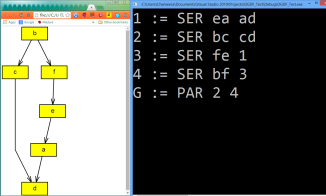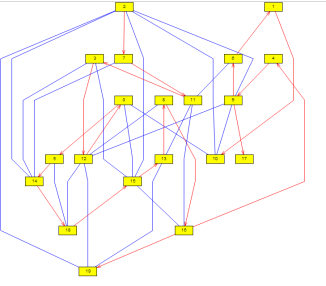Introduction
his implementation support Member( ), Insert( ), and Delete( ) functions. Populate the linked list with n random, but unique values. Each value should be between 0 and 2^16– 1. Then perform m random Member, Insert, and Delete operations on the link list. Let mMember, mInsert, and mDelete be the fractions of operations of each type. You may use any values within 0 and 2^16– 1 while performing these three operations.
However, to simplify the implementation, a new value inserted into the list cannot be a value already in the list (it may be a value that was initially added to the list, but later removed).
Code
/* File: serial_linked_list .c
* Purpose: Implement a linked list as a Parallel program (based on Pthreads) with read-write locks for the entire linked list
* Implementation should support Member( ), Insert( ), and Delete( ) functions.
* Populate the linked list with n random, but unique values.
* Each value should be between 0 and 2^16 - 1.
* Then perform m random Member, Insert, and Delete operations on the link list.
* Let mMember, mInsert, and mDelete be the fractions of operations of each type.
* You may use any values within 0 and 2^16 – 1 while performing these three operations.
* However, to simplify the implementation, a new value inserted into the list cannot be a
* value already in the list (it may be a value that was initially added to the list, but later removed).
*
* Compile: gcc -g -Wall -o parallel_link_list_2 parallel_link_list_2.c -pthread
*
* Run: ./parallel_link_list_2 <number of threads><n> <m> <mMember> <mInsert> <mDelete>
* n is the number of initial unique values in the Link List.
* m is number of random Member, Insert, and Delete operations on the link list.
* mMember is the fractions of operations of Member operation.
* mInsert is the fractions of operations of Insert operation.
* mDelete is the fractions of operations of Delete operation.
*
* Input: none
*
* Output: This version prints the elapsed time required for
* Parallel program (based on Pthreads) with read-write locks for the entire linked list calculations.
*
* Notes:
* CS4532 Concurrent Programming
* Take Home Lab 1
* Due – Jun 28 before 11:55 PM
*
* Date: 07/25/2014
*
* Author : Wijebandara WMNC
* 100598M
* Computer Science and Engineering
*
* Email : chameerawijebandara@gmail.com
*
*/
#include <stdio.h>
#include <stdlib.h>
#include <math.h>
#include <pthread.h>
#include <time.h>
struct list_node_s
{
int data;
struct list_node_s* next;
};
const int MAX_THREADS = 1024;
long thread_count;
pthread_rwlock_t rwlock;
struct list_node_s* head = NULL;
int n;
int m;
float mMember;
float mInsert;
float mDelete;
int count_member=0;
int count_insert=0;
int count_delete=0;
int member( int value, struct list_node_s* head_p );
int insert(int value, struct list_node_s** head_pp);
int delete (int value, struct list_node_s** head_pp);
int printList( struct list_node_s* head_p );
void* thread_oparation(void* rank);
/* Only executed by main thread */
void Get_args(int argc, char* argv[]);
void Usage(char* prog_name);
double Serial_pi(long long n);
/* Main function */
int main(int argc, char* argv[])
{
int i=0;
long thread; /* Use long in case of a 64-bit system */
pthread_t* thread_handles;
double start, finish, elapsed;
/* read command line arguments */
Get_args(argc, argv);
/* initially populating the link list */
for(;i<n;i++)
{
int r = rand()%65536;
if(!insert(r,&head))
{
i--;
}
}
//printf("%f\n",mMember);
//printf("%f\n",mInsert);
thread_handles = (pthread_t*) malloc (thread_count*sizeof(pthread_t));
start = clock();
pthread_rwlock_init(&rwlock, NULL);
for (thread = 0; thread < thread_count; thread++)
{
pthread_create(&thread_handles[thread], NULL,thread_oparation , (void*)thread);
}
for (thread = 0; thread < thread_count; thread++)
{
pthread_join(thread_handles[thread], NULL);
}
pthread_rwlock_destroy(&rwlock);
finish = clock();
elapsed = (finish - start)/CLOCKS_PER_SEC;
printf("Elapsed time = %e seconds\n", elapsed);
//printf("%.10f,\n", elapsed);
//printf("Member operation count = %d\n",count_member);
//printf("Insert operation count = %d\n",count_insert);
//printf("Delete operation count = %d\n",count_delete);
//printList(head);
return 0;
}/*main*/
/*------------------------------------------------------------------
* Function: thread_oparation
* Purpose: Compleetea the link list oparations by the thread running this
* In arg: rank
* Ret val: ignored
* Globals in: n, thread_count, mMember, mInsert, mDelete
* Global in/out: count_member, count_insert, count_delete
*/
void* thread_oparation(void* rank)
{
long my_rank = (long) rank;
double factor, my_sum = 0.0;
long long i;
long long my_m = m/thread_count;
for( i=0; i< my_m; i++ )
{
float prob = (rand()%10000/10000.0);
//printf("%f\n",prob);
int r = rand()%65536;
if(prob < mMember)
{
pthread_rwlock_rdlock(&rwlock);
member(r,head);
count_member++;
pthread_rwlock_unlock(&rwlock);
}
else if(prob < mMember + mInsert )
{
pthread_rwlock_wrlock(&rwlock);
insert(r,&head);
count_insert++;
pthread_rwlock_unlock(&rwlock);
}
else
{
pthread_rwlock_wrlock(&rwlock);
delete(r,&head);
count_delete++;
pthread_rwlock_unlock(&rwlock);
}
}
return NULL;
} /* Thread_sum */
/*------------------------------------------------------------------
* Function: member
* Purpose: Check if the given values is in the link list
* In arg: value, head_p
* Globals in:
* Global in/out:
* Return val: Return 1 if value exist otherwise 0
*/
int member( int value, struct list_node_s* head_p )
{
struct list_node_s* curr_p = head_p;
while( curr_p != NULL && curr_p->data < value )
{
curr_p = curr_p->next;
}
if(curr_p == NULL || curr_p->data > value)
{
return 0;
}
else
{
return 1;
}
}/* member */
/*------------------------------------------------------------------
* Function: insert
* Purpose: Add new values in to link list
* In arg: value, head_p
* Globals in:
* Global in/out:
* Return val: Return 1 if value successfully add to the list otherwise 0
*/
int insert(int value, struct list_node_s** head_pp)
{
struct list_node_s* curr_p = *head_pp;
struct list_node_s* pred_p = NULL;
struct list_node_s* temp_p = NULL;
while(curr_p !=NULL && curr_p->data < value)
{
pred_p = curr_p;
curr_p = curr_p->next;
}
if(curr_p == NULL || curr_p->data > value)
{
temp_p = malloc(sizeof(struct list_node_s));
temp_p->data = value;
temp_p->next = curr_p;
if(pred_p == NULL)
{
*head_pp = temp_p;
}
else
{
pred_p->next = temp_p;
}
return 1;
}
else
{
return 0;
}
} /*insert*/
/*------------------------------------------------------------------
* Function: delete
* Purpose: remove values from the link list
* In arg: value, head_p
* Globals in:
* Global in/out:
* Return val: Return 1 if value successfully remove from the list otherwise 0
*/
int delete (int value, struct list_node_s** head_pp)
{
struct list_node_s* curr_p = *head_pp;
struct list_node_s* pred_p = NULL;
while(curr_p != NULL && curr_p->data < value)
{
pred_p = curr_p;
curr_p = curr_p->next;
}
if(curr_p != NULL && curr_p -> data < value)
{
if(pred_p == NULL){
*head_pp = curr_p->next;
free(curr_p);
}
else
{
pred_p->next = curr_p->next;
free(curr_p);
}
return 1;
}
else
{
return 0;
}
} /*delete*/
/*------------------------------------------------------------------
* Function: Get_args
* Purpose: Get the command line args
* In args: argc, argv
* Globals out: thread_count, n, m, mMember, mInsert, mDelete
*/
void Get_args(int argc, char* argv[]) {
if (argc != 7)
{
Usage(argv[0]);
}
thread_count = strtol(argv[1], NULL, 10);
if (thread_count <= 0 || thread_count > MAX_THREADS)
{
Usage(argv[0]);
}
n = (int) strtol(argv[2], (char **)NULL, 10);
m = (int) strtol(argv[3], (char **)NULL, 10);
mMember = (float) atof(argv[4]);
mInsert = (float) atof(argv[5]);
mDelete = (float) atof(argv[6]);
if (n <= 0 || m <= 0 || mMember + mInsert + mDelete!=1.0) Usage(argv[0]);
} /* Get_args */
/*------------------------------------------------------------------
* Function: Usage
* Purpose: Print a message explaining how to run the program
* In arg: prog_name
*/
void Usage(char* prog_name) {
fprintf(stderr, "usage: %s <number of threads> <n> <m> <mMember> <mInsert> <mDelete>\n", prog_name);
fprintf(stderr,"n is the number of initial unique values in the Link List.\n");
fprintf(stderr,"m is number of random Member, Insert, and Delete operations on the link list.\n");
fprintf(stderr,"mMember is the fractions of operations of Member operation.\n");
fprintf(stderr,"mInsert is the fractions of operations of Insert operation.\n");
fprintf(stderr,"mDelete is the fractions of operations of Delete operation.\n");
exit(0);
} /* Usage */
/*------------------------------------------------------------------
* Function: printList
* Purpose: Add in the terms computed by the thread running this
* In arg: value, head_p
* Globals in:
* Global in/out:
* Return val: Estimate of pi using n terms of Maclaurin series
*/
int printList( struct list_node_s* head_p )
{
struct list_node_s* curr_p = head_p;
while(curr_p != NULL)
{
printf("%d ",curr_p->data);
curr_p = curr_p->next;
}
printf("\n");
} /*printList */











